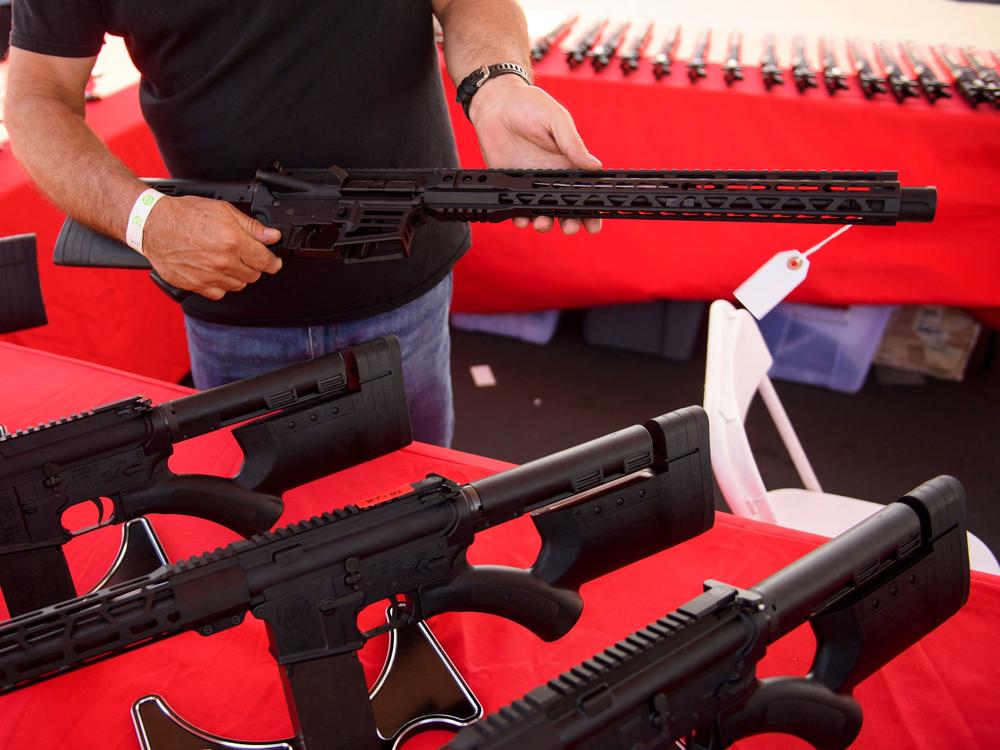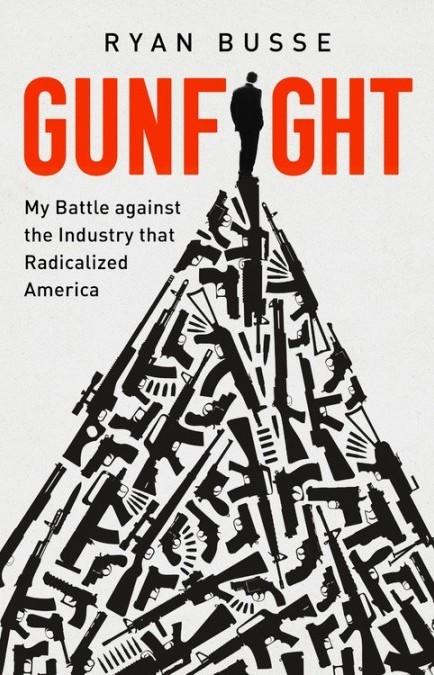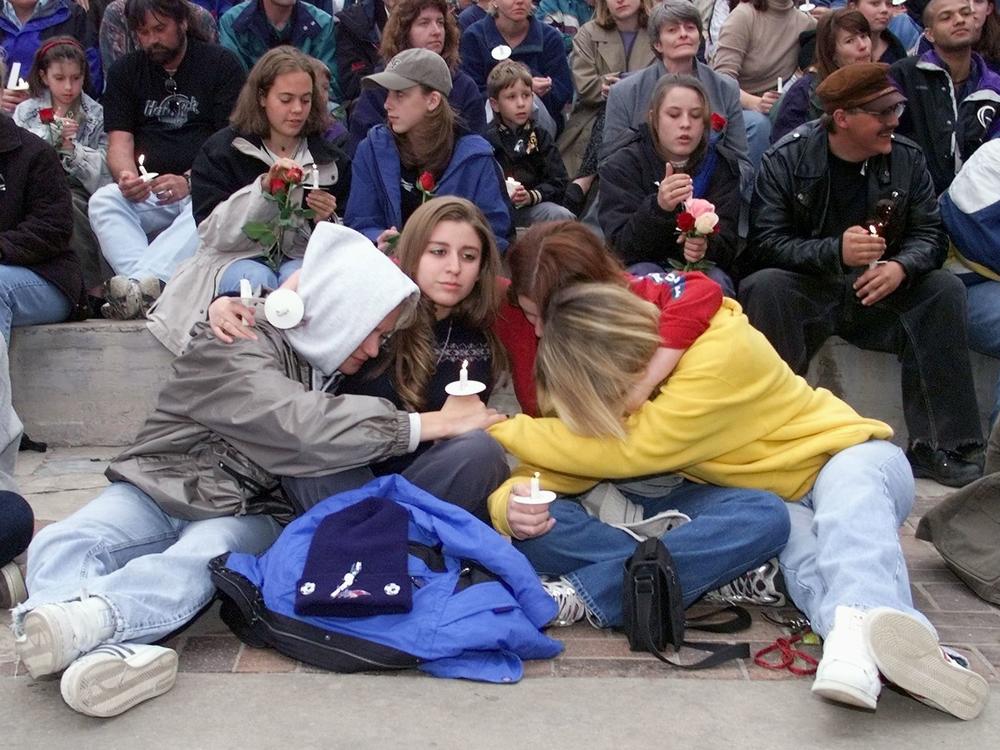Section Branding
Header Content
Former gun industry insider explains why he left to fight for the other side
Primary Content
Author Ryan Busse jokes that he was born with "a shotgun in one hand and a rifle in the other." It's a shorthand he uses to explain the significant role that guns played in his childhood in western Kansas.
"I grew up hunting and shooting with my father. Guns were things we used on the ranch and farm," he says. "The few times that we got to spend together doing something fun and enjoyable, oftentimes it was with a gun. ... [Guns] are things that became very culturally important to us."
After college, Busse went to work for the firearms manufacturer Kimber America, where he was so good at marketing the weapons that he became a rising star of the industry. But over the years, he became disillusioned when he saw the NRA refuse to consider gun controls after mass shootings.
"After Columbine, [the NRA] stumbled upon this idea that fear and conspiracy and hatred of the other could be used to drive and win political races," he says. "And, accidentally, those are exactly the same things that in high doses drove unhealthy portions of firearm sales."
Busse notes that when he first started out, weapons manufacturers refused to market high-powered automatic weapons to the public. But, he says, the gun makers and the NRA have since embraced military-style weapons and tactical gear, branding them as symbols of masculinity and patriotism. This is when, he says, "the frightening vigilante activity that we have seen with Kyle Rittenhouse or the various other incidents across the country really got its start." (Rittenhouse was tried and acquitted of all charges related to the shooting deaths of two men and the wounding of another during protests in Kenosha, Wis., in 2020.)
Busse eventually left the gun industry. In 2020, he accepted a position as an adviser to Joe Biden's presidential campaign, and in 2021 he was hired as a senior advisor to the gun violence prevention group Giffords. He says he still owns and uses guns, and he believes in Americans' right to do the same.
But, he says, "I also know that every right that we enjoy has to be balanced with the appropriate amount of responsibility. And I believe that over time ... that has gotten badly out of whack."
Busse has written a new book called Gunfight: My Battle Against the Industry that Radicalized America.
Interview highlights
On what changed the way he viewed the gun industry
When Sandy Hook happened, our boys were almost exactly that same age. It was just horrific to think about it, and so I became more disillusioned and more troubled, and it just became this sort of perilous existence. It was much tougher. And I couldn't hold my tongue. That knife edge was tougher to walk on. ...
I did my best to try to change the things I can change. Something I didn't see coming, perhaps, was the degree to which the industry grew and changed into this behemoth. I didn't see the unbelievably huge ballooning of guns and the gun industry's importance in politics. When I started, really, it was very much like a small cottage industry. Everybody knew everybody. The companies were pretty small, but much like many other facets of America, it grew into something so large that I was deluding myself to think that I could have a measurable impact on something that had grown that large and powerful.
On how the NRA identity and strategy changed
My grandfather, who was a proud FDR Democrat, his favorite hat was the big black NRA gold-lettered hat. ... the NRA to him meant safety and camaraderie and responsibility. Then my father was an NRA member and up until the point where he disavowed his membership, we received the NRA magazines in our home. ... They were about interesting guns or shooting competitions or trapper leagues or things of that sort. Never about the impending doom of our republic or some conspiracy theory. ... It's often reported that the NRA is sort of a tool of firearms manufacturers. I found it to be exactly the opposite: The NRA ran the show. They set the course for the industry and everybody followed, and nobody questioned.
On how the NRA and the industry reacted to the 1999 Columbine school massacre
That was obviously the first large mass school shooting in our country. And as it so happened, it happened just south of Denver and the large NRA convention was set to happen in Denver just about 10 days later. And it sent a shock through the entire industry, and the NRA ended up canceling the largest portion of their convention that year, but they held the business meetings and there were large protests in Denver against the business meetings. The NRA ended up in what is now a rather infamous approach where they ended up doubling down instead of giving in. I believe the politics of never give an inch, never acknowledge any improvement or work towards any improving policy, really started then.
On the NRA's refusal to close the "gun-show loophole" after Columbine
The gun-show loophole simply means that ... gun sales can happen without a federally mandated background check if they happen not through a federally licensed dealer. So an amateur gun trader, somebody who sells a few guns a year, can go to a gun show and sell a gun, literally, to whoever they want without a background check. And that probably should have been closed legislatively after Columbine, but the NRA decided to fight that despite the horror of that Columbine shooting. ... I believe two or three of the guns that were used in Columbine were purchased at a gun show just on the north end of Denver. And so it was really an opportune time to shut that loophole and still today, more than 20 years later, we have not shut that loophole.
On two things that boost gun sales — shootings and Democrats getting elected
Usually within hours after a mass shooting, then there would be discussions of potential legislative fixes and that sort of fear, which the NRA figured out how to tap into, could be used to both drive voters to the polls and ... it also drove gun sales like nobody ever imagined. So if you overlay gun sales over the last 20 years with mass shootings, soon after each mass shooting until just the last couple of years ... there would be incredible gun booms.
The other thing that would drive gun sales is when any Democrat was elected, certainly elected as president, because again, the same fear was used that guns would be banned or that there would be legislative activity that would make it more difficult to get guns, so everybody would rush out and buy them after these events.
Everything that happened was then spun in some fearful, conspiratorial, racial, just hate-filled way. Everything was spun that way, because every word that came out had to keep ... this sort of political pressure cooker. The way that the NRA figured out that it could succeed is to get the country just one step below boiling and just try to hold it there.
On the state of the NRA today
I think the NRA is an organization, at least currently, [that] is certainly weakened. ... NRA is not at its high point with regards to membership or fundraising or organizational health, that's for sure. But the sort of politics and NRA-ism that has been released across the country has not gone anywhere. And I liken it somewhat to a brush fire that is now raging across the country. It's dry and it's windy and it's still burning things. So I don't know that the NRA has gone or that it will be gone, but even weakened, the things that it has unleashed are certainly not weakened.
Sam Briger and Seth Kelley produced and edited this interview for broadcast. Bridget Bentz, Molly Seavy-Nesper and Meghan Sullivan adapted it for the Web.
Copyright 2021 Fresh Air. To see more, visit Fresh Air.



